Goliath is out of the nest, and I was lucky enough to witness the event!
19 December 2007
It is 6 a.m. when I arrive at the blind. I have been watching this nest every day for a month now and for the past week Goliath, the larger of the two chicks, has been poking his head out of the cavity entrance. With binoculars I can see him very clearly from where I sit in the little, palm-branch blind, 20 meters from the nest tree. Shortly after sunrise I watch him as he climbs to the entrance and looks around at the outside world, blinking his big, dark baby eyes. I smile as I watch him: gorgeous and majestic, yet clown-like and clumsy. Still a big baby-gawky and tripping over himself, making awkward attempts to preen while perched. Now and then, a yawn escapes from the big, black beak.
At 8 a.m., as his parents fly into the area and perch in a nearby tree, Goliath takes his first cautious steps out of the nest cavity. He stands and wobbles above the cavity entrance on the steeply angled trunk. He grips the bark, his sharp claws barely puncturing the surface of the giant hardwood, and begins to flap his wings. His body bounces from side to side to the rhythm of still-uncoordinated wing beats, threatening to tear him from the tree. His parents fly to the branch above him and he immediately becomes braver, climbing up the trunk to the first fork, 2 meters above the nest cavity and about 15 meters above the ground. He flaps his wings, trips over his feet and starts to fall, but uses his wings and beak to pull himself back up to the fork. He looks more like a kitten learning how to climb than like a bird. "Don't fall, Goliath," I say in my mind. "Don't get too brave-you're still stub-tailed, skinny and clumsy and it's a long way down."
In the following hours I watch as his parents lavish attention upon him-caressing and nibbling him, preening each feather on his body. He bows his head until his beak touches the bark, his eyes half closed, feathers raised to facilitate the gentle nibbles of his parents. Goliath leans to the left, raising his right wing, enjoying his mother's delicate preening of his wingpit and side. He leans to the right and his father preens the other side. His parents nibble the tiny feathers and bare skin around his face and proceed down his crop to his belly. Gentle, methodical, and very, very thorough. Watching the three of them together is one of the most beautiful scenes I have ever observed in nature. The display of tenderness-the finesse with which mom and dad preen their chick-brings tears to my eyes. At one point, while mom is preening Goliath, dad moves over to the other side and begins to preen mom. It is a picture of absolute love: the chick with his head bowed to the ground, mom moving her tongue and bill tip along his tiny cheek feathers, and dad nudging his head under mom's wing to preen her auxiliaries (wingpits), underwing coverts and upper leg.
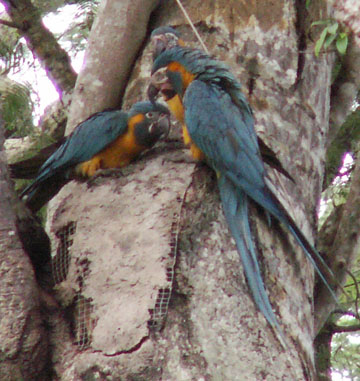
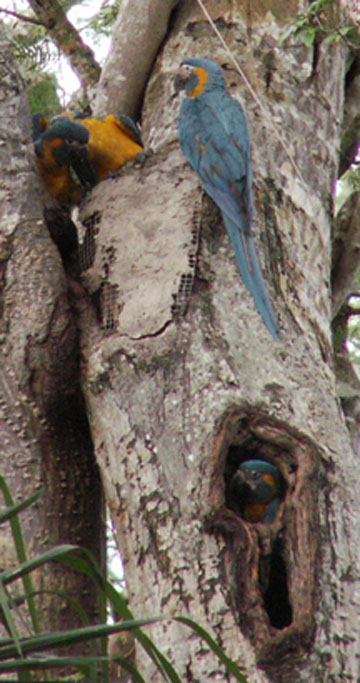
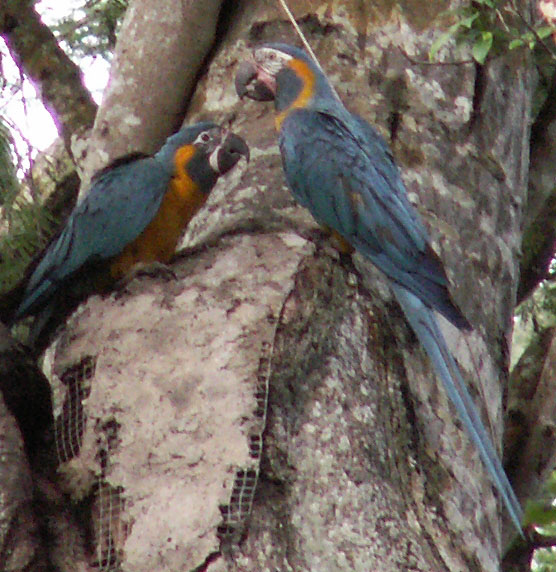
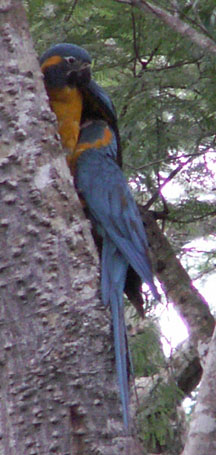
Meanwhile, little Manu (the younger sibling) seems to feel terribly left out, proclaiming his displeasure by perching at the cavity entrance and squawking loudly. When mom finishes preening Goliath she climbs down the trunk and enters the nest cavity to attend to Manu and Goliath seems to take the cessation in preening as an opportunity to traipse higher. He is about to reach the next fork, with dad right behind him trying to preen him as he climbs when...Goliath slips. He flaps madly, but it's too late and I hear his frantic wing beats descend to a crash as he falls into a patch of bromeliads at the base of the nest tree. The father looks fairly shocked and simply stares down as his chick screeches from the ground. Mom immediately pops her head out of the cavity to see what's going on and the babysitter (me) jumps out of the blind and goes to help the fallen chick.
Upon seeing my approach, the parents screech with distress, circling the nest tree several times before leaving the area. Goliath also screeches in distress and tries to fly away but makes no progress; he can't fly and his wings barely help to increase his groundspeed as he waddles away from me. I pick him up easily and he calms down, probably remembering that human touch is more annoying than harmful and is often associated with food. I speak to him as I carry him back to camp with me to get the climbing equipment. I tell him that he is lucky-most chicks only get to fledge once. But lucky Goliath has a babysitter and a fan club of people all around the world who care that he fledges successfully, so he will be one of the few wild parrots to get a second chance at fledging.
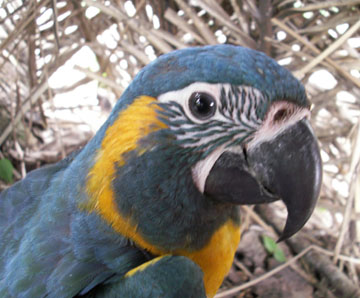
I return to the nest tree with the climbing equipment, put the rope up and begin to ascend. "Please just stay put until you can fly," I command him as I pull him out of my backpack and ease him into the cavity from which he prematurely bailed. Little Manu screeches loudly from the nest floor and Goliath climbs up and out of sight inside the tree. With my mission completed, I attach the figure-8, unclip my ascenders, and slide to the ground. I quickly gather my climbing equipment and walk back to the blind. There is no sight or sound from the chicks for the next two hours and I hope that they will stay put while I take a break and eat lunch in camp.
20 December 2007
I arrive at the blind at 7:00 a.m and see one chick poking its head out of the cavity entrance. Is this Goliath or did Goliath already fledge? Is he high in a tree with his parents? Could he have fledged yesterday during my lunch break and been eaten by a predator? At 7:15 the chick retracts his head and I am left staring at the empty cavity entrance and listening to all the bird sounds around me, wondering if Goliath is in or out. At 7:38 I hear the familiar, whiny call of the adults, arriving nearby. They perch out of sight, but I can hear them, about twenty-five meters from the nest tree, talking quietly...with Goliath? There are definitely chick sounds coming from that direction and as my curiosity becomes overwhelming I sneak out of the blind to take a look. I creep towards the adults' muffled trills and squawks, trying to be silent in my giant, mud-covered, rubber boots. Luckily, the adults' attention is so focused on something else that they don't notice my arrival-and that "something else" I discover, as I scan the area around me, is Goliath! But the poor stub-tailed thing doesn't look like he is much better off than when I rescued him from the ground: he is clinging to a dead, broken, precariously hanging branch in a small, scraggly Motacu Palm, about six meters off the ground.
Goliath looks at me, seeming much less concerned by my presence than by his problematic situation. He tries to climb higher, gripping the branch and pulling himself up with his beak until suddenly, noticing his beak near the bend of his wing, he seems to forget his predicament and begins to nibble his wrist feathers. Almost immediately he loses his balance and flaps his wings madly, clambering back onto the palm branch. "What do I do," I wonder. I don't want to disturb the family at this extremely sensitive time, but I also can't just go back to the blind and say, "qué será, será" when a Blue-throated Macaw chick is dangling from a dead branch, probably can't fly yet, and would be an easy target for any predator in the area. My solution? The portable Blue-throated Macaw babysitting unit (a.k.a. the portable blind).
I spend 15 minutes silently moving the portable blind to within view of Goliath, although despite my efforts, the adults see me and fly away, screeching. Luckily, only three minutes after I have settled in, the parents return and renew their quiet trills of encouragement to the chick, who has barely moved since I found him here.
I wonder how long he has been in this tree? One thing is clear: he did not arrive in his current position by flying; he climbed from the ground. And if he has already fallen to the ground twice, then what's to say that he won't fall again? I think to myself that surely this scrawny, stub-tailed chick can not yet fly, and as I see his posturing in preparation for take off I imagine that his trajectory will end with him on the ground. "Do I really want a video of a Blue-throated Macaw chick biffing his flight and crashing into the ground," I wonder as I click my camera into video mode. The howler monkeys sing in full force in the background, almost blocking out the quiet trills of the parents, who seem to be saying, "come on, you can do it."
And then, with a display of all the force in his tiny body, Goliath pushes off from the branch and flies, straight through the trees and off the island, his parents close behind him. And so, at 8:45 a.m., the parents and their newly fledged chick disappeared as silhouettes over the golden savannah.
Click on the link below to see footage of Goliath’s first flight:
































